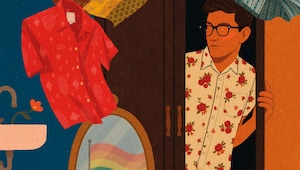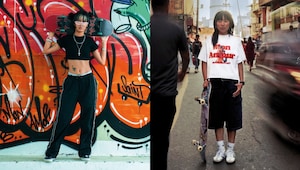
Meet the 16-year-old entrepreneur redefining adaptive fashion in India
From magnetic buttons to stylish uniforms, Vivaan’s brand Aekya is proving that inclusive fashion can be cool, comfortable, and chic.

When most 15-year-olds are worrying about exams or figuring out their weekend plans, Vivaan was busy rethinking the fashion industry. It all started when he watched his grandfather struggle to button a shirt—something most of us don’t even think twice about. For his grandfather, though, stiff collars, tricky zips, and unforgiving fabrics turned getting dressed into a daily battle.
Instead of just feeling bad, Vivaan decided to do something. Fast-forward a year, and he’s now the founder of Aekya, an adaptive clothing label that flips the script on fashion because, as he puts it, “clothes should adapt to people, not the other way around.”
His mission? To make dressing empowering, not exhausting, for those who are differently-abled or living with mobility challenges.
Fashion that actually fits real life
For some people, getting dressed isn’t a simple morning routine; it’s a struggle with buttons that won’t close, seams that dig in, or fabrics that itch. Aekya was designed to change that.
Think magnetic buttons and Velcro closures (no fine motor skills needed), detachable sleeves and collars (for when it’s too hot or too cold), and super soft, sensory-friendly fabrics that feel like a hug, not a hassle.

There are even hidden pockets and microfibre panels to keep essentials handy. But the real beauty? The clothes don’t scream “medical wear.” They’re sleek, polished, and totally wearable, made to blend in, not stand out. Because, honestly, inclusion shouldn’t mean compromise.
How it all began
Aekya started at home, with Vivaan sketching ideas for his grandfather’s clothes at the kitchen table. One thoughtful design led to another, and soon, his concept grew into a full-fledged label that’s now catching national attention.
Aekya’s custom uniforms for Mitti Café—a social enterprise run by differently-abled individuals—were even unveiled in the presence of President Droupadi Murmu. The brand has also collaborated with the Bihar School of Yoga to design comfortable, accessible clothing for local differently-abled communities.

But Vivaan’s plans go beyond fashion; he’s also launching nano-entrepreneurship kiosks, giving differently-abled individuals the chance to run their own tailoring or retail setups. It’s part of his larger vision: empowering people, one stitch at a time.
And Vivaan’s not done yet. When he’s not designing or brainstorming inclusive business models, he’s writing children’s books (his debut, Dabloo, tackles bullying and compassion), debating at Yale’s World Scholars’ Cup, or experimenting with AI models in sports training. He’s also trained in tabla and Hindustani classical music, and is a Lodha Genius Scholar as well as a YLAC High School Achiever.
So yes, the kid’s got range.
Why Aekya’s work really matters
India has around 27 million differently-abled citizens, and globally, the adaptive clothing market is set to cross USD 13 billion soon. This isn’t a niche; it’s a movement that’s long overdue.
Aekya is rethinking fashion’s priorities. It’s a reminder that inclusion isn’t optional; it’s essential. Because style should never come with conditions.
All images: The brand
Also read: Inside the world of Bollywood’s most iconic costume designers
more from Fashion

A love letter to florals and the beauty of growing beyond the lines

Meet the Nepal skaters turning anime, Y2K and metal music into a fashion movement

Six fashion insiders on the chaos, clarity, and creativity behind their wardrobes

The curvy girl’s guide to wearing every “scary” trend—and absolutely owning it

The goth-girl fashion bible for a darkly romantic winter wardrobe

Eight cities, eight stories—check out where India’s matcha lovers get their fix

How the fragrance boom is changing the way we wear perfume every single day

Vishal Jethwa on fear, family, and the fashion moment that helped him fight imposter syndrome

How to survive party season without burning out your body

Can a beauty founder afford to look ‘unbeautiful’?
